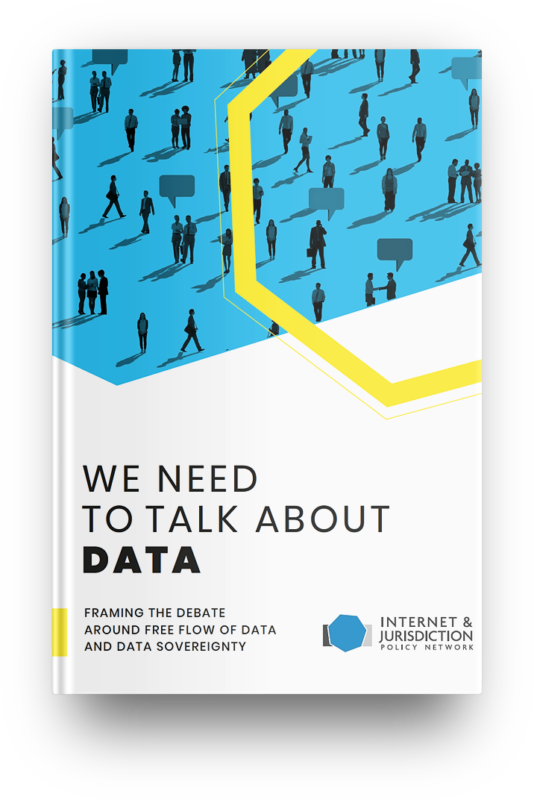
We need to talk about data – New report reframes the debate around data sovereignty
The dueling slogans: “free flow of data” and “data sovereignty” actually prevent seriously addressing the complex challenges of cross-border data flows. A report, released this week by the Internet & Jurisdiction Policy Network, reframes the debate to foster a more nuanced approach of this critical topic for the digital society.
Lorrayne Porciuncula is the co-author, with Bertrand de La Chapelle, of a new report We Need to Talk About Data: Framing the Debate Around Free Flow of Data and Data Sovereignty from the Internet & Jurisdiction Policy Network. Released on 6 April 2021, the Report seeks to unpack these two concepts and frame some of the key issues around cross-border data flows. In this short article, Ms. Porciuncula explains why this Report was needed to foster a better common understanding of policy approaches around data and kick-start a more nuanced debate around this important topic.
Data is everywhere and can be categorised in multiple ways
Data is everywhere and it is an increasingly valuable asset for firms, governments, and society at large. Data flows are considered a key enabler of digital transformation, critical for healthcare, new business models, education, or agriculture, to name just a few. However, as data becomes more prevalent in our lives and starts to map and understand not only cross-border services but also our health and preferences, many concerns arise, related to trust, as in privacy and security, but also trade, competition, skills, economic imbalances, societal impacts, etc.
Talks about data are taking place but not leading to much progress
Due to the importance of data, it is no surprise that the issue is high on international policy agendas (from the G20 or G7, to organisations such as the Organisation for Economic Cooperation and Development (OECD), Asia Pacific Economic Cooperation (APEC), the Association of Southeast Asian Nations (ASEAN), the African Union, or the World Trade Organisation, just to name a few examples. However, international debates are yet to map clear paths forward on how to organise our common datasphere – understood here as holistic comprehension of this new space, spans encompassing all data, personal and non-personal, which is collected, stored, and processed across sectors and territories. Ultimately this is about our shared digital future and about how we collaborate to govern it. The Internet & Jurisdiction Policy Network Report tries to advance on that front – identifying our common challenges and also innovative solutions.
The start of a much-needed debate
Over a period of 2 months, I&JPN brought together actors from governments, the private sector, civil society, technical community international organisations, and academia to delve into two key arguably polarising concepts: “free flow of data” and “data sovereignty”.
A survey of over 100 respondents, 4 roundtable discussions, and over 30 interviews with experts helped us better understand actors’ perspectives. All participants were encouraging this effort to shift the debate towards reconciling these apparently conflicting approaches.
The policy speak around data is full of analogies (data as the new oil, air, currency, infrastructure, etc), but what do words have on policy action? In doing this Report we did not aim to be exhaustive but to offer a holistic snapshot of the concerns and perspectives from prominent stakeholders to kick-start further debate.
A first pass has lead to interesting conclusions
The Report presents three key findings for moving forward.
- First, we need a debate that is global, multi-stakeholder, and cross-sectoral, in order to bridge silos.
- Second, the discussion needs to be reframed to ensure that this complex and novel issue is addressed in a much more nuanced manner.
- Third, the Report highlights the need to be innovative in the tools, frameworks and concepts we use to address the issue of data.
Striving to achieve common objectives, such as maximising well-being and defining the distributions of responsibilities among actors, could guide efforts to solve some of the challenges.
How to organise the coexistence and interactions of billions of people and entities – with vastly different interests – connected through the internet and a global datasphere is a major issue of the digital age.
More needs to be done
The I&JPN Secretariat made a deliberate effort to capture diverse views and perspectives and will organise, on the basis of this initial framing, further consultations across sectors and regions to expand awareness and understanding of these evolving concepts and their policy implications.
Building the methodology for addressing the problems of the digital age is as important as addressing the problems themselves. We hope this report will help catalyse a more nuanced and collaborative discussion on how to organise our common datasphere.
Tl;dr
The Report highlights the need to innovate in the approaches we use to address the issue of data and in particular cross-border data flows. I&JPN hopes this report will help catalyse a more nuanced and collaborative discussion on how to organise our common datasphere.

Lorrayne Porciuncula, leads I&JPN work on cross-border data flows. Her professional and academic experience has been focused on issues around data, Internet governance, infrastructure regulation and communication policy. Prior to joining the Internet & Jurisdiction Policy Network, she worked at the OECD (2014-2020) as the Strategic Advisor for Digital Economy Policy, coordinating issues related to data governance, artificial intelligence and blockchain, and leading the production of several reports and country studies related to connectivity, infrastructure regulation, technology convergence and inclusion.

You will receive our latest blog articles once a month in a newsletter.
Data governance
AI at the microphone: The voice of the future?
From synthesising voices and generating entire episodes, AI is transforming digital audio. Explore the opportunities and challenges of AI at the microphone.
Do Community Notes have a party preference?
This article explores whether Community Notes effectively combat disinformation or mirror political biases, analysing distribution and rating patterns.
How People Analytics can affect the perception of fairness in the workplace
People Analytics in the workplace can improve decisions but may also heighten feelings of unfairness, impacting employee trust and workplace relationships.




